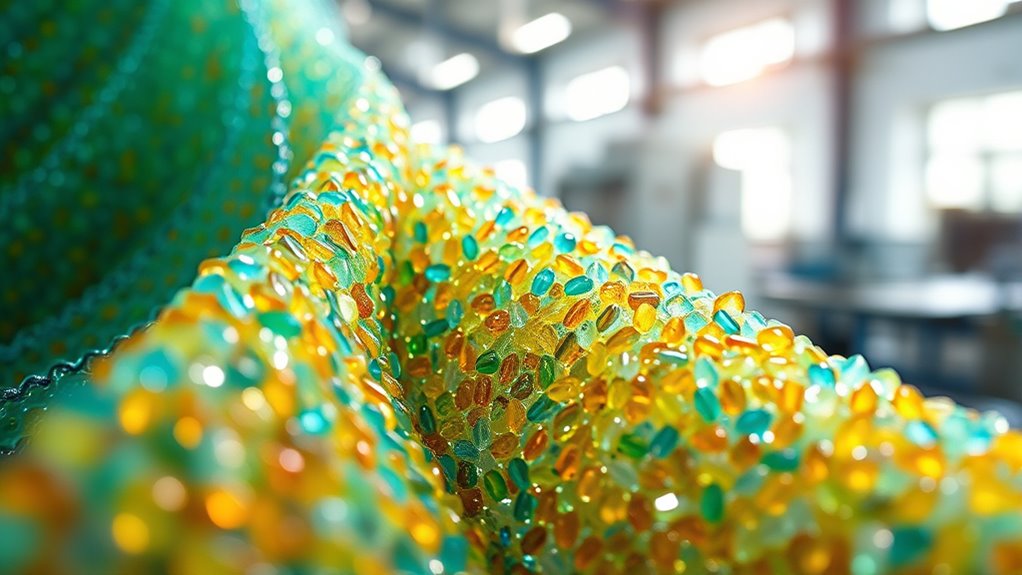Recycled polyester turns plastic waste, like bottles and fishing nets, into fabric. The process breaks down plastic into small chips or fibers, then melts and spins them into yarn, creating eco-friendly textiles. This method conserves resources, reduces water and energy use, and helps keep plastics out of landfills and oceans. By choosing recycled polyester, you’re supporting sustainable fashion and responsible manufacturing—stay with us, and you’ll discover how this innovative fabric benefits both the planet and your style.
Key Takeaways
- Recycled polyester starts by collecting plastic waste like bottles and fishing nets, then breaking them into small chips or fibers.
- These chips are melted and spun into yarn, creating a durable fabric similar to traditional polyester.
- The process conserves raw materials, reduces water and energy use, and minimizes environmental impact.
- Recycled polyester can be blended or used alone, suitable for various clothing styles including activewear.
- It promotes sustainable fashion by transforming waste into eco-friendly fabric, supporting circular economies and responsible consumption.

Have you ever wondered how your favorite clothes can be more eco-friendly? The answer lies in understanding how recycled polyester transforms plastic waste into stylish, sustainable garments. This process begins with sustainable manufacturing, which aims to reduce environmental impact at every stage. Instead of relying on virgin petroleum-based resources, recycled polyester is made from existing plastic bottles, fishing nets, and other waste materials. By diverting these plastics from landfills and oceans, recycled polyester offers a smarter way to produce textiles that are kinder to the planet.
Recycled polyester transforms plastic waste into eco-friendly, stylish garments through sustainable manufacturing.
When you choose clothing made from recycled polyester, you’re supporting the development of eco friendly fibers. These fibers are created through a process that breaks down plastic waste into small chips or fibers, which are then melted and spun into yarn. This method not only conserves raw materials but also markedly reduces water and energy consumption compared to traditional polyester production. The result is a fabric that looks and feels like conventional polyester but carries a much lower environmental footprint. It’s a perfect example of how sustainable manufacturing practices can lead to innovative, eco-conscious products.
The benefits extend beyond just environmental savings. Recycled polyester often costs less to produce, which can translate into more affordable fashion options for consumers. Plus, because it’s made from recycled materials, it minimizes the reliance on finite resources, helping to conserve natural ecosystems. Many brands now highlight their use of recycled polyester as part of their commitment to sustainability, encouraging shoppers like you to make more responsible choices. When you purchase garments made from these eco friendly fibers, you’re choosing to support a greener supply chain that promotes circular economies and reduces waste.
Moreover, advances in recycling technology mean that manufacturers can now produce high-quality recycled polyester that’s durable and versatile. This fiber can be blended with other textiles or used on its own in a variety of clothing items—from activewear to everyday fashion. Its versatility makes it an ideal fabric for those seeking stylish, eco-conscious options. As awareness of environmental issues grows, more brands are turning to recycled polyester as a sustainable alternative, making it easier for you to align your fashion choices with your values.
In essence, recycled polyester exemplifies how sustainable manufacturing and eco friendly fibers can transform waste into wearable art. By choosing products made from recycled polyester, you’re not only getting fashionable clothes but also contributing to a cleaner planet. It’s a simple step that demonstrates how innovation in textile production can truly make a difference. Additionally, embracing mindfulness practices related to your purchasing habits can further reinforce your commitment to sustainability.
Frequently Asked Questions
How Long Does Recycled Polyester Take to Decompose Naturally?
Recycled polyester can take anywhere from 20 to 200 years to biodegrade in a landfill, depending on environmental factors. You should know it has a long landfill persistence, meaning it doesn’t break down quickly. Its biodegradation timeline is much slower than natural fibers, which highlights the importance of recycling and reducing plastic waste. By choosing sustainable options, you can help minimize this long-lasting impact on the environment.
What Are the Environmental Impacts of Recycling Polyester?
Recycling polyester helps reduce marine pollution by preventing plastic waste from reaching oceans. However, it still consumes energy, which contributes to greenhouse gas emissions. You might feel good about choosing recycled polyester, but it’s important to take into account its environmental impacts. Recycling saves resources, yet the energy used in the process can offset some benefits. Overall, recycling polyester is better than new production, but it’s not entirely impact-free.
Can Recycled Polyester Be Recycled Again?
Yes, recycled polyester can be recycled again through the same fiber recycling process. However, the fiber quality may decline with each cycle, affecting durability and appearance. You should be aware that repeated recycling can lead to fiber degradation, so it is important to take into account the impact on fabric quality. Proper recycling methods help maintain as much fiber integrity as possible, allowing you to reuse recycled polyester multiple times while minimizing environmental impact.
Is Recycled Polyester as Durable as Virgin Polyester?
You might worry that recycled polyester isn’t as durable as virgin polyester, but that’s not the case. Recycled fibers often have comparable fiber strength, ensuring material longevity. Advanced manufacturing techniques help maintain high quality, so recycled polyester withstands wear just as well. With proper care, it performs reliably in the long run, offering a sustainable option without sacrificing strength or durability.
How Does Recycled Polyester Production Affect Water Usage?
You’ll find that recycled polyester production generally uses less water compared to virgin polyester, promoting water conservation. However, it still involves processes that generate industrial wastewater, which needs proper treatment to prevent pollution. By choosing recycled polyester, you help reduce water consumption and support eco-friendly practices. While some wastewater is inevitable, advancements are continuously improving the sustainability of recycled polyester manufacturing, making it a better option for the environment.
Conclusion
Now that you know how plastic transforms into fabric, you’re like a bridge between two worlds—turning waste into wardrobe wonders. Recycled polyester isn’t just a fabric; it’s a symbol of change, proving that even the most unlikely materials can find new life. By choosing recycled, you’re helping to clean our planet and make fashion more sustainable. So, next time you shop, remember: your choices can weave a brighter, greener future.









